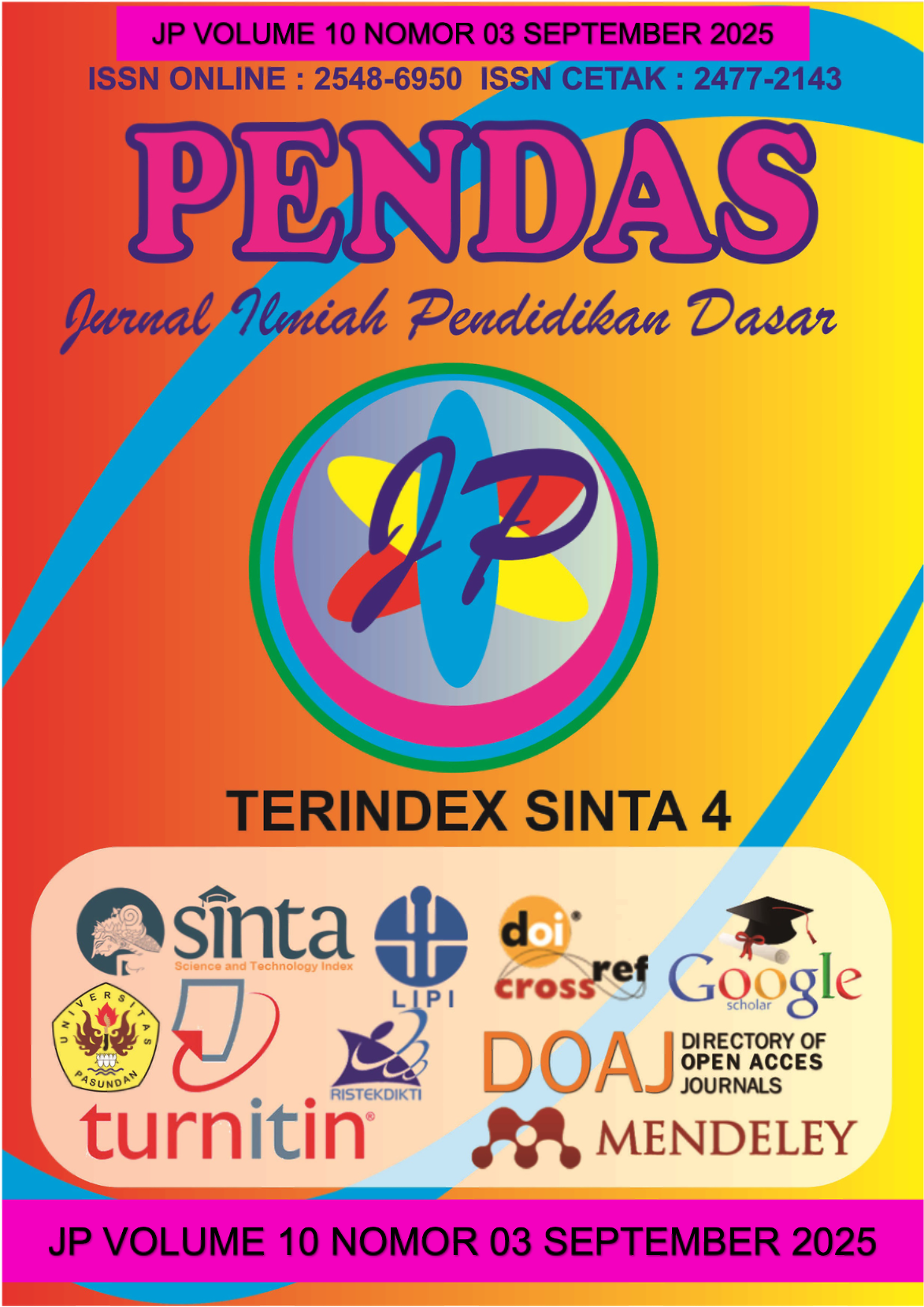PENERAPAN STRATEGI PEMBELAJARAN STAD (STUDENT TEAMS ACHIEVEMENT DIVISION) BERBANTUAN KUIS INTERAKTIF UNTUK MENINGKATKAN KEMAMPUAN LITERASI MEMBACA PESERTA DIDIK KELAS V DI SDN 238 PALEMBANG
DOI:
https://doi.org/10.23969/jp.v10i03.31029Keywords:
Reading Literacy Skills,, kooperatif tipe STAD, interactive quizAbstract
This study aims to improve the reading literacy skills of fifth-grade students at SDN 238 Palembang in the Indonesian language subject through the implementation of the Student Teams Achievement Division (STAD) learning strategy assisted by interactive quizzes. The main problem faced is the low level of students’ reading literacy skills, as indicated only 7.41% of students achieving the Minimum Completeness Criteria (KKM) before the intervention. This research is a Classroom Action Research (PTK) conducted in two cycles, which included the stages of planning, implementation, observation, and reflection. The results showed a significant improvement in students’ reading literacy skills. In the first cycle, learning mastery reached 48.1% with an average score of 63.5, and in the second cycle, it increased to 81.4% with an average score of 81.1. The implementation of interactive quizzes such as Wordwall and Baamboozle in the STAD strategy also proved effective in enhancing active participation, collaboration, and students’ learning motivation. Therefore, the STAD learning strategy assisted by interactive quizzes can be considered an effective alternative teaching strategy to improve reading literacy skills at the elementary school level.
Downloads
References
Abdini, R. M. (2021). Penggunaan Model Pembelajaran STAD (Student Team Achievement Division) untuk Meningkatkan Kemampuan Membaca Pemahaman Peserta Didik Kelas III Sekolah Dasar. Kalam Cendekia : Jurnal Ilmiah Kependidikan, 9(1), 374–378.
Amelia, E., & Widiyono, A. (2022). Pengaruh Model Kooperatif Tipe Stad Berbantuan Media Manipulatif Terhadap Hasil Belajar Siswa Di Sekolah Dasar. Jurnal Pendidikan Dan Konseling, 4(3), 542–548.
Hasmar, T. B., Husniati, A., & Kristiawati. (2024). Pengaruh Pembelajaran Kooperatif Tipe Stad Berbantuan Multimedia Interaktif Terhadap Hasil Belajar Matematika Kelas IV di SD Muhammadiyah Bantaeng. Katalis Pendidikan : Jurnal Ilmu Pendidikan Dan Matematika, 1(2), 130–146. https://doi.org/10.62383/katalis.v1i2.276
Harahap, D. G. S., Nasution, F., Nst, E. S., & Sormin, S. A. (2022). Analisis Kemampuan Literasi Siswa Sekolah Dasar. Jurnal Basicedu, 6(2), 2089–2098. https://doi.org/10.31004/basicedu.v6i2.2400
Karmila, R. D., Prabawa, A. H., & Susiati, S. (2023). Implementasi Metode STAD dalam Meningkatkan Kemampuan Membaca Siswa Sekolah Dasar. Buletin Pengembangan Perangkat Pembelajaran, 5(1). https://doi.org/10.23917/bppp.v5i1.22935
Mawanti, N. D., & Cholily, Y. M. (2021). Peningkatan Minat Belajar Siswa Tunagrahita Menggunakan Model STAD Berbantuan Puzzle di Kelas 1 Sekolah Dasar. Jurnal Pemikiran Dan Pengembangan Sekolah Dasar), 9(1), 28–39. https://doi.org/10.22219/jp2sd.v9i1.15182
Permana, S. P., & Kasriman, K. (2022). Pengaruh Media Pembelajaran Wordwall terhadap Motivasi Belajar IPS Kelas IV. Jurnal Basicedu, 6(5), 7831–7839. https://doi.org/10.31004/basicedu.v6i5.3616
Pratiwi, D. C., Saulina, H., Yusuf, M. E., Putra, O., Sabilila, A., & Dewi, Y. L. (2023). Penerapan Permainan Edukatif pada Pendekatan TARL untuk Meningkatkan Motivasi dan Minat Belajar Peserta Didik Kelas IV SDN Polehan 1 Kota Malang. Jurnal Ekonomi, Bisnis Dan Pendidikan, 3(8). https://doi.org/10.17977/um066.v3.i8.2023.4
Sarika, R., Gunawan, D., & Mulyana, H. (2021). Analisis Kemampuan Membaca Pemahaman Siswa Kelas V di SD Negeri 1 Sukagalih. CaXra : Jurnal Pendidikan Sekolah Dasar, 01(02), 62–69.
Sholeh, M., Murtono, M., & Masfuah, S. (2021). Efektivitas Pembelajaran Google Classroom Dalam Meningkatkan Kemampuan Literasi Membaca Siswa. Jurnal Educatio FKIP UNMA, 7(1), 134–140. https://doi.org/10.31949/educatio.v7i1.889
Downloads
Published
Issue
Section
License
Copyright (c) 2025 Pendas : Jurnal Ilmiah Pendidikan Dasar

This work is licensed under a Creative Commons Attribution 4.0 International License.














































